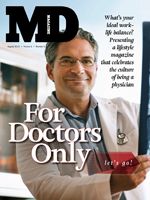Publication
Article
MD Magazine®
The Quality Assurance Committee - No One Expects the Spanish Inquisition
Author(s):
Responding to the public's demand to seek redress for injuries, real or imagined, at the hands of physicians, the established forces of organized medicine have turned inward in an attempt to better police their members. Out of these good intentions came the QA departments, to be found now in every hospital, HMO, and clinic. Their mandate is to weigh accusations, often brought secretly; investigate, often done selectively; deliberate, often done behind closed doors; and sentence, often without chance of appeal.
A court of criminal inquiry against the established religion first appeared in France in the 13th century and attained its full glory in 1484, under Queen Isabella of Spain, with the founding of the Supreme General Inquisition. Serving at the pleasure of the King, known himself as the Grand Inquisitor, his vassals were sent throughout Spain and it's colonies during the Age of Absolutism.
The Inquisitors were an instrument used to maintain absolute rule, to discover and suppress all unorthodox views. Once identified in secret accusation, the heretic was seized by the court's "familiars," and his property was confiscated. Proceeding with imprisonment, secret examination, and torture, these righteous officials brought forth confessions to all manner of criminally impure thoughts and actions. Culmination was often in the public execution, with death by conflagration at the Auto da Fe, on Sundays, the Lord's day of rest.
Today, we have the Quality Assurance Committees. Responding to the public's demand to seek redress for injuries, real or imagined, at the hands of physicians, the established forces of organized medicine have turned inward in an attempt to better police their members. Out of these good intentions came the QA departments, to be found now in every hospital, HMO, and clinic. Their mandate is to weigh accusations, often brought secretly; investigate, often done selectively; deliberate, often done behind closed doors; and sentence, often without chance of appeal. Who says history doesn't repeat itself repeat itself?
The scenario that follows happens every day to practicing physicians. A complaint is made; sometimes it's a letter from a patient, sometimes from a nurse or aid. Sometimes it's generated by a chart review. It is forwarded to the QA committee chairperson, usually an administrator or department head. It is then assigned to a committee member to investigate. Records are then pulled, and often an inquiry is made casually to the physician:
"Dear John, we got this complaint - well, not really a complaint, your understand, sort of a, umm, question - about something you did. It's nothing serious, really, but could you tell us what you remember about this case? No hurry, drop us a note. Sorry to bother you and all that. If you're too busy to get back to us today, don't worry, we'll take care of it..."
A few weeks go by, and nothing more is said. Everyone's all smiles, friendly nods in the hallway - "How’re the kids, John?" or "Lookin' sharp today, John!" then a form letter appears via interoffice mail:
"To: John, MD. The QA committee has reviewed the charges against you in the case of patient Sally Sorrow, MR#123-456-789, assaulted by you on 2/1/10. The committee has voted to change the initial Classification of Care from 3B (serious actual adverse patient outcome that was caused by errors in management), to 3A (serious actual patient outcome that was possibly preventable) under it's Automatic Benevolent Appeals Process. This Committee is organized as a Medical Peer Review Committee under the Medical Malpractice tort Reform Act of 1986. This law provides that the proceedings, reports, and records of a medical record peer review committee shall be confidential and shall not be subject to subpoena or discovery, or introduced into evidence, on any judicial or administrative proceedings, except proceedings held by the Board of Registration in Medicine. Have a nice day.”
In medicine, the last doctor is always the smartest. The QA committee is the academic version of the Monday morning quarterback. QA members make extensive use of the celebrated, mythical “restroscope,” with its spiritually perfected microscopic vision. And, on top of it all, they usually lack humility.
Before the Spanish Inquisition, The Romans asked, "Sed quis custodiet ipsos Custodes?" -- "But who is to guard the Guards themselves?"
I remember the good old days of "M&M" rounds (Morbidity and Mortality). The accused were forced to present the case before a crowd of peers. Often the accused turned to drugs (usually Inderal - to keep the tremor out of hands and voice) before facing the mob. No cigarettes before a firing squad, but often a buffet lunch. Questions were asked, explanations were given. It was not for the faint of heart. But it was an open, and occasionally brawling, spectacle. It was often personal. Attendance was always high ("John's presenting at M&M today!" "Really - I always hated that arrogant SOB! What time does it start?")
It was open, live, and usually educational. I, personally, would rather have a root canal than face the M&M mob. But you learned from it. You remembered. It was out in the open, unlike the QA committee which is a blunt instrument used to sucker punch its victim. The M&M tradition was one of fine showmanship, where you could cut your own throat and never feel it, being distracted and honored at the same time.
Alan Berkenwald, MD, graduated from BU School of Medicine '78 and is board-certified in Internal Medicine. He is now working as a Hospitalist in a community hospital in Northampton, MA, the medical director of a local Skilled Nursing Facility, and practices addiction medicine part-time. He writes the blog “In the Name of Medicine" for HCPLive.com.
